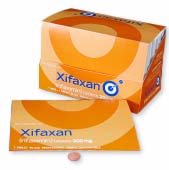 Commentary by Sumathi Sivapalasingam MD, NYU Division of Infectious Diseases
Commentary by Sumathi Sivapalasingam MD, NYU Division of Infectious Diseases
Rifaximin is an oral semi-synthetic analog of rifampin which is essentially not absorbed (bioavailability <0.4%) making it useful for the treatment of intra-luminal intestinal infections, while having little systemic side effects. There are several advantages to using rifaximin: it does not appear to lead to bacterial resistance, a problem frequently encountered with rifampin; colonic fecal flora is minimally altered; and it has a safety profile similar to placebo. Like other rifamycins, it exerts its activity by inhibiting RNA synthesis.
FDA-Approved indications
Traveler’s Diarrhea: Rifaximin received FDA-approval for treatment of travelers’ diarrhea caused by non-invasive strains of E. coli in patients 12 years and older. The drug is not as effective in treating bloody diarrhea or diarrhea due to invasive pathogens (Shigella or Campylobacter). Three randomized double-blinded trials in travelers with diarrhea demonstrated a decrease in the duration of diarrhea compared to placebo or an equivalent response compared to ciprofloxacin. The symptoms that prompted treatment in these trials included having 3 or more unformed stools during the 24 hour period before enrollment with abdominal pain, excess gas, nausea or vomiting, fecal urgency, tenesmus, or fever.
A recent randomized double-blind placebo controlled study demonstrated that rifaximin is also effective for the prevention of travelers’ diarrhea, although the wide-spread use (there are 50 million travelers a year!) of an antibiotic to prevent mild to moderate diarrhea is controversial.
Non-FDA indications
Infectious diarrhea: Studies examining the usefulness of rifaximin in the treatment of diarrhea in the non-traveler are of poorer quality than those done in travelers, but one double-blind study did show a better reduction in the number of unformed stools in the rifaximin group compared to placebo.
Rifaximin is also being examined for the treatment of C. difficile-associated diarrhea and has been shown to be of similar efficacy in reducing diarrhea compared to oral vancomycin. One case-report by Johnson et al. describes their experience of using rifaximin after a course of oral vancomycin to prevent recurrences of C. difficile colitis in patients with multiple recurrences. One disturbing event, however, was the finding of a rifaximin-resistant strain of C. difficile in one their patients who failed therapy with vancomycin and rifaximin. Larger studies are necessary before rifaximin could be recommended for use in this clinical setting.
Hepatic encephalopathy: Compared with lactulose, several double-blind studies have shown improved cognitive function and reduction of ammonia levels with rifaximin treatment in patients with hepatic encephalopathy. Rifaximin has been given “orphan” status by the FDA for use for this indication which means that its cost can be reimbursed by insurance plans.
Small bowel bacterial overgrowth: Although rifaximin has little effect on large colon flora, it can reduce small bowel flora with subsequent reduction in gas and abdominal distention.
In summary, Rifaximin is FDA-approved for the treatment of non-dysenteric and afebrile traveler’s diarrhea and has also been shown to be useful for diarrheal prophylaxis in travelers. Further study is required to examine its usefulness in patients with multiple recurrences of C. difficile colitis, hepatic encephalopathy and inflammatory bowel disease.
In my opinion, suffering from diarrhea during travel, whether for pleasure or work, can range from being a mild annoyance to a major embarrassment to an emergency requiring admission to a foreign hospital. Prevention is, as usual, the best medicine, but can put a crimp on some of the joys of traveling—like eating street food and drinking beverages served by your local host. Sometimes it is difficult to avoid eating contaminated food and therefore having medications on hand that cause minimal to no side effects and can prevent the onset of Montezuma’s revenge is a good thing.
Pepto-Bismal (bismuth subsalicylate) is an often underappreciated over the counter travel companion. It is a bismuth salt of salicylic acid that is minimally absorbed from the GI tract and works on the gastric mucosa by coating it. It also has local antimicrobial properties. To use as prevention, it is 65% effective if one takes 2 tabs before each of 3 daily meals and at bedtime. It can cause a black tongue (an unsightly if benign side effect) and tinnitus in some people.
Rifaximin might also be a useful drug to include in the toiletry bags of traveler’s for whom a bout of diarrhea would be more than just a little annoying. These include traveler’s on a tight schedule, such as musicians, lecturers, scientists, diplomats, as well as travelers who have suffered this ailment in previous trips (perhaps an indication of increased susceptibility) or travelers with immune-suppression or unstable medical condition such as insulin dependent diabetes or heart failure. I would not be inclined to give this to all patients. Rifaximin can be 72-77% effective at diarrheal prevention when 200mg is taken 2 times a day with meals while in the area of risk.
To empower reliable patients to self-treat while traveling, it may be prudent to provide travelers with two prescriptions: one for rifaximin and one for either a fluoroquinolone or azithromycin (if traveling to areas with known problems with fluoroquinolone-resistant Campylobacter). They can be instructed to use the rifaximin for the treatment of watery diarrhea without fever or bloody stools, and the fluoroquinolone or azithromycin if diarrhea develops with fever and bloody stools.
Selected readings:
Adachi JA, DuPont HL. Rifaximin: A novel nonabsorbed rifamycin for gastrointestinal disorders Clin Infect Dis 2006;42:541
DuPont H, Jiang Z, Okhuysen PC et al. A randomized double-blind, placebo-controlled trial of rifaximin to prevent traveler’s diarrhea. Ann Intern Med 2005;142:805.
Johnson S et al. Interruption of recurrent Clostridium difficile-associated diarrhea episodes by serial therapy with vancomycin and rifaximin. Clin Infect Dis 2007 Mar 15; 44:846-8
